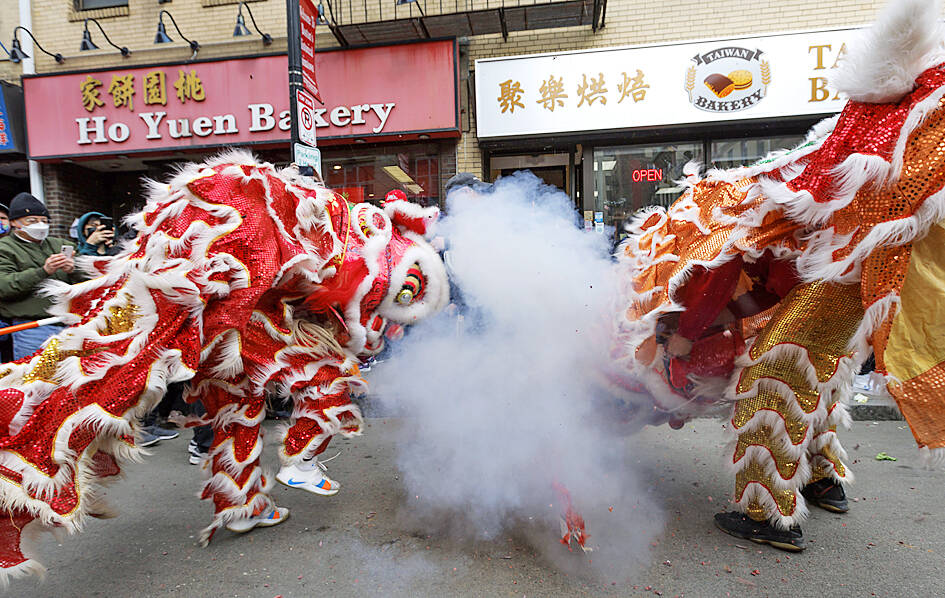A Boston resident allegedly worked with Chinese government officials over about four years to keep tabs on Chinese activists and dissidents in the area who were calling for pro-democracy reforms in the communist nation, federal prosecutors said on Friday.
Liang Litang (梁利堂), 63, a US citizen who lives in Boston’s Brighton neighborhood, was charged with conspiracy to act as an agent of a foreign government and acting as an agent of a foreign government without notice to the US attorney general, the US attorney’s office in Boston said.
Liang, who was arrested Tuesday, was released on Thursday on US$25,000 bail with electronic monitoring after pleading not guilty, court documents showed.

Photo: EPA-EFE
He also surrendered his passport and was ordered not to leave Massachusetts or have any contact with government officials from the People’s Republic of China (PRC).
Liang was accused of “providing the PRC government with information on Boston-area individuals and organizations; organizing a counterprotest in the United States against pro-democracy dissidents; providing photographs of and information about US-based dissidents to PRC government officials; and providing the names of potential recruits to the PRC’s Ministry of Public Security,” one of the documents said.
The goal was to “covertly advance the PRC government’s goals and agenda within the United States,” indictment said.
China has been accused in other cases of trying to interfere with democracy advocates in the US who are critical of Beijing.
Last month, two men were accused by US authorities of helping establish a secret police station in New York on behalf of the Chinese government, and about three dozen Chinese People’s Armed Police Force officers were charged with using social media to harass US-based dissidents.
Liang’s cooperation with the Chinese government allegedly started in 2018 and lasted until at least last year, prosecutors said.
In one case, Liang allegedly sent a Chinese government official pictures and video footage of a student activist he believed was responsible for destroying Chinese flags during a 2018 protest in Boston’s Chinatown neighborhood, they said.
Liang allegedly organized an event in Boston in 2018 that was attended by at least two Chinese government officials, one of whom allegedly asked Liang for the name of a person who attended and worked for an elected Boston official.
Liang allegedly provided the name as requested, authorities said.
Court documents did not name the elected official.
Liang allegedly provided video footage of a dissident attending the “Boston Stands with Hong Kong” march in August 2019 and the following month sent photographs of dissidents in front of the Boston Public Library to a Chinese government official, calling them a “bunch of clowns trying to cause trouble,” prosecutors said.
Liang allegedly had contacts with senior Chinese diplomats in the US, the Chinese Ministry of Public Security and the Chinese United Front Work Department, which reports directly to the Central Committee of the Chinese Communist Party to further the party’s objectives, prosecutors said.
He allegedly visited China in September last year, where he attended events to mark the 70th anniversary of the founding of the PRC.

Airlines in Australia, Hong Kong, India, Malaysia and Singapore yesterday canceled flights to and from the Indonesian island of Bali, after a nearby volcano catapulted an ash tower into the sky. Australia’s Jetstar, Qantas and Virgin Australia all grounded flights after Mount Lewotobi Laki-Laki on Flores island spewed a 9km tower a day earlier. Malaysia Airlines, AirAsia, India’s IndiGo and Singapore’s Scoot also listed flights as canceled. “Volcanic ash poses a significant threat to safe operations of the aircraft in the vicinity of volcanic clouds,” AirAsia said as it announced several cancelations. Multiple eruptions from the 1,703m twin-peaked volcano in

Farmer Liu Bingyong used to make a tidy profit selling milk but is now leaking cash — hit by a dairy sector crisis that embodies several of China’s economic woes. Milk is not a traditional mainstay of Chinese diets, but the Chinese government has long pushed people to drink more, citing its health benefits. The country has expanded its dairy production capacity and imported vast numbers of cattle in recent years as Beijing pursues food self-sufficiency. However, chronically low consumption has left the market sloshing with unwanted milk — driving down prices and pushing farmers to the brink — while

‘SIGNS OF ESCALATION’: Russian forces have been aiming to capture Ukraine’s eastern Donbas province and have been capturing new villages as they move toward Pokrovsk Ukrainian Commander-in-Chief Oleksandr Syrskyi on Saturday said that Ukraine faced increasing difficulties in its fight against Moscow’s invasion as Russian forces advance and North Korean troops prepare to join the Kremlin’s campaign. Syrskyi, relating comments he made to a top US general, said outnumbered Ukrainian forces faced Russian attacks in key sectors of the more than two-and-a-half-year-old war with Russia. Ukrainian President Volodymyr Zelenskiy in a nightly address said that Ukraine’s military command was focused on defending around the town of Kurakhove — a target of Russia’s advances along with Pokrovsk, a logistical hub to the north. He decried strikes

China has built a land-based prototype nuclear reactor for a large surface warship, in the clearest sign yet Beijing is advancing toward producing the nation’s first nuclear-powered aircraft carrier, according to a new analysis of satellite imagery and Chinese government documents provided to The Associated Press. There have long been rumors that China is planning to build a nuclear-powered aircraft carrier, but the research by the Middlebury Institute of International Studies in California is the first to confirm it is working on a nuclear-powered propulsion system for a carrier-sized surface warship. Why is China’s pursuit of nuclear-powered carriers significant? China’s navy is already